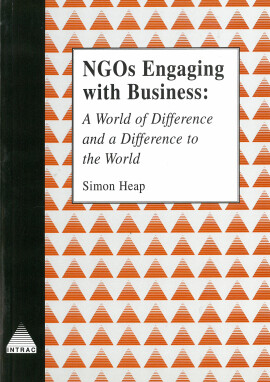
NGOs Engaging with Business
A World of Difference and a Difference to the World
NGOs Engaging with Business presents the findings of INTRAC's inquiry into the changing nature of relationships between NGOs and the Private Sector. By learning the lessons of such engagements, this two year research mainly funded by the Ford and Soros Foundations explores the potential for the two sectors to work together for global development in the future. In order to help both NGOs and the Private Sector in their dealings with each other, the book systematises the benefits and drawbacks of NGO-business engagements, analyses the engagement processes of advocacy and direct action in such areas of codes of conduct, sustainability, environmental management, social equity and human rights, collates the lessons of engagement, and proffers alternatives and possibilities of future engagements between the two sectors.
NGOs Engaging with Business covers a variety of important subjects affecting NGO-business relations, such as the strategy and tactics for engagement from adversarial to cosy funding partners, with the emerging middle ground of negotiated, constructive co-operation; what development NGOs might learn from environmental NGOs; and how NGOs should tackle corporate codes of conduct. Several NGO-business collaborations are documented in detail including: the WWF/Unilever-created Marine Stewardship Council; Rainforest Alliance's environmental management partnership and Chiquita in the Costa Rican banana sector; and the Federation of Indian Chambers of Commerce and Industries; and Living Earth's partnership with Shell in Nigeria and the UK. By using examples from Colombia, Kazakhstan, Kyrgyzstan and Uzbekistan, the Southern and Eastern country-specific factors that determine different levels of NGO-business relations are examined.
Published: 2000
Pages: 320
Paperback: 9781897748534
NGOs Engaging with Business covers a variety of important subjects affecting NGO-business relations, such as the strategy and tactics for engagement from adversarial to cosy funding partners, with the emerging middle ground of negotiated, constructive co-operation; what development NGOs might learn from environmental NGOs; and how NGOs should tackle corporate codes of conduct. Several NGO-business collaborations are documented in detail including: the WWF/Unilever-created Marine Stewardship Council; Rainforest Alliance's environmental management partnership and Chiquita in the Costa Rican banana sector; and the Federation of Indian Chambers of Commerce and Industries; and Living Earth's partnership with Shell in Nigeria and the UK. By using examples from Colombia, Kazakhstan, Kyrgyzstan and Uzbekistan, the Southern and Eastern country-specific factors that determine different levels of NGO-business relations are examined.





